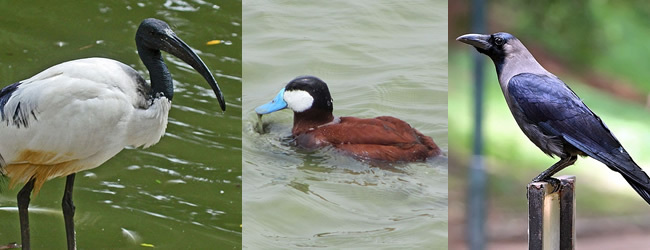
On August 2nd, European Union introduced a new list of prohibited invasive animals and plants.These species cannot be bred or kept in a way which would lead to release to the wild. Originally, aviculturists were afraid that some parrot species may be also listed. However, any parrots are not included in the list. In total, there are three bird species: African Sacred Ibis (Threskiornis aethiopicus), Ruddy Duck (Oxyura jamaicensis) and House Crow (Corvus splendens). With this action, European Union realized its original aim to prohibit breeding of 37 invasive species (23 animal species, 14 plant species).
.
The regulation was approved on July 13th and it became effective after 20 days. However, EU countries have two years to implement it to their code of law. „All changes are in process of ongoing legislation adjustment,“ said representative of the Czech Ministry of Environment Dominika Pospisilova. Zoological gardens have already received an announcement from European Union which suggests what kind of changes they are supposed to do to prevent violation of law.
None of the listed species can be imported to any of EU countries. Appropriate veterinary authorities will check it and fine it if necessary. In this regard, State Veterinary Administration of Prague launched inspection of all imported animals and plants at the Vaclav Havel Airport. A person who violates this regulation may receive fine up to 800 euro. As for companies, the fine may be as high as 40 000 euro. „Invasive species cannot be imported to EU, kept, bred or transported across the European Union. Owners are also not allowed to release them to the wild,“ said Petr Pejchal from State Veterinary Administration.
.
If the State Veterinary Administration confiscates invasive animal species then it will be exported back to the country from where it was brought. The law allows veterinarian to sleep animals if it is necessary but Pejchal indicates that this would be just extraordinary solution. The owner of confiscated animals is supposed to cover all expenses on quarantine and return. It is interesting to see that the list of prohibited species does not include problematic species like american mink, raccoon dog or japanese knotweed.
The owners of listed animals do not have to sell them but they must prevent their reproduction or escape. The same goes for ZOOs.
.
PLANTS
American skunk cabbage
Asiatic tearthumb
Curly waterweed
Eastern baccharis
Floating pennywort
Floating primrose
Green cambomba
Kudzu vine
Parrot’s feather
Persian hogweed
Water hyacinth
Water primrose (two species)
Whitetop weed
.
ANIMALS
Amur sleeper
Asian hornet
Small Indian mongoose
Bryant’s fox squirrel
Chinese mitten crab
Coypu
Eastern crayfish
Grey squirrel
Indian house crow
Marbled crayfish
Muntjac deer
North American bullfrog
Pallas’s squirrel
Raccoon
Red eared slider
Red swamp crayfish
Ruddy duck
Sacred ibis
Siberian chipmunk
Signal crayfish
South American coati
Topmouth gudgeon
Virile (northern) crayfish
.
Title photo:
crow: (c) Muhammad Mahdi Karim , Permission is granted to copy, distribute and/or modify this document under the terms of the GNU Free Documentation License, Version 1.2 only as published by the Free Software Foundation; with no Invariant Sections, no Front-Cover Texts, and no Back-Cover Texts. A copy of the license is included in the section entitled GNU Free Documentation License.
ibis: (c) Dick Daniels. This file is licensed under the Creative Commons Attribution-Share Alike 3.0 Unported license.
duck: (c) Eamon Decker. This file is licensed under the Creative Commons Attribution-Share Alike 4.0 International license.